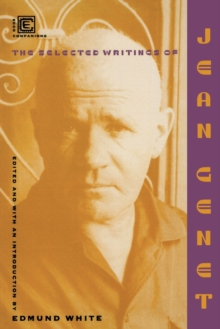Chapter One Weidmann appeared before you in a five o'clock edition, his head swathed in white bands, a nun and yet a wounded pilot fallen into the rye one September day like the day when the world came to know the name of Our Lady of the Flowers.
His handsome face, multiplied by the presses, swept down upon Paris and all of France, to the depths of the most out-of-the-way villages, in castles and cabins, revealing to the mirthless bourgeois that their daily lives are grazed by enchanting murderers, cunningly elevated to their sleep, which they will cross by some back stairway that has abetted them by not creaking.
Beneath his picture burst the dawn of his crimes: murder one, murder two, murder three, up to six, bespeaking his secret glory and preparing his future glory. A little earlier, the Negro Angel Sun had killed his mistress. A little later, the soldier Maurice Pilorge killed his lover, Escudero, to rob him of something under a thousand francs, then, for his twentieth birthday, they cut off his head while, you will recall, he thumbed his nose at the enraged executioner. Finally, a young ensign, still a child, committed treason for treason's sake: he was shot. And it is in honor of their crimes that I am writing my book. At the end of thephrases it breaks, and that break makes it so sweet that it seems borne by the music of angels, which horrifies me for angels fill me with horror, being, I imagine, neither mind nor matter, white: filmy, and frightening, like the transluscent bodies of ghosts. These murderers, now dead, have nevertheless reached me, and whenever one of these luminaries of affliction falls into my cell, my heart beats fast, my heart beats a loud tattoo, if the tattoo is the drum-call announcing the capitulation of a city. And there follows a fervor comparable to that which wrung me and left me for some minutes grotesquely contorted, when I heard the German plane passing over the prison and the burst of the bomb which it dropped nearby.
In the twinkling of an eye, I saw a lone child, borne by his iron bird, laughingly, strewing death.
For him alone were unleashed the sirens, the bells, the hundred-and-one cannon shots reserved for the Dauphin, the cries of hatred and fear.
All the cells were atremble, shivering, made with terror; the prisoners pounded the doors, rolled on the floor, shrieked, screamed blasphemies, and prayed to God.
I saw, as I say, or thought I saw, an eighteen-year-old child in the plane, and. from the depths Of my 426 I smiled at him lovingly. I say vacant, for all the eyes are clear and must be sky blue, like the razor's edge to which clings a star of transparent light, blue and vacant like the windows of buildings under construction, through which you can see the sky from thewindows of the opposite wall.
Like those barracks which in the morning are open to all the winds, which you think are empty and pure when they are swarming with dangerous males, sprawled promiscuously on their beds.
I say empty, but if they close their eyes, they become more disturbing to me than are huge prisons to the nubile maiden who passes by the high-barred windows, prisons behind which sleeps, dreams, swears, and spits a race of murderers, which makes of each cell the hissing nest of a tangle of snakes, but also a kind of confessional with a curtain of dusty serge.
These eyes, seemingly without mystery, are like certain closed cities -- Lyons, Zurich -- and they hypnotize me as much as do empty theaters, deserted prisons, machinery at rest, deserts, for deserts are closed and do not communicate with the infinite.
Men with such faces terrify me, whenever I have to cross their paths warily, but what a dazzling surprise when, in their landscape, at the turning of a deserted lane, I approach, my heart racing wildly, and discover nothing, nothing but looming emptiness, sensitive and proud like a tall foxglove! The big, inflexible, strict pimps, their members in fullbloom -- I no longer know whether they are lilies or whether lilies and members are not totally they, so much so that in the evening, on my knees, in thought, I encircle their legs with my arms-all that rigidity floors me and makes me confuse them, and the memory which I gladly give as food for my nights is of yours, which, as I caressed it, remained inert, stretched out; only your rod, unsheathed and brandished, went through my mouth with the suddenly cruel sharpness of a steeple puncturing a cloud of ink, a hat pin a breast ...

